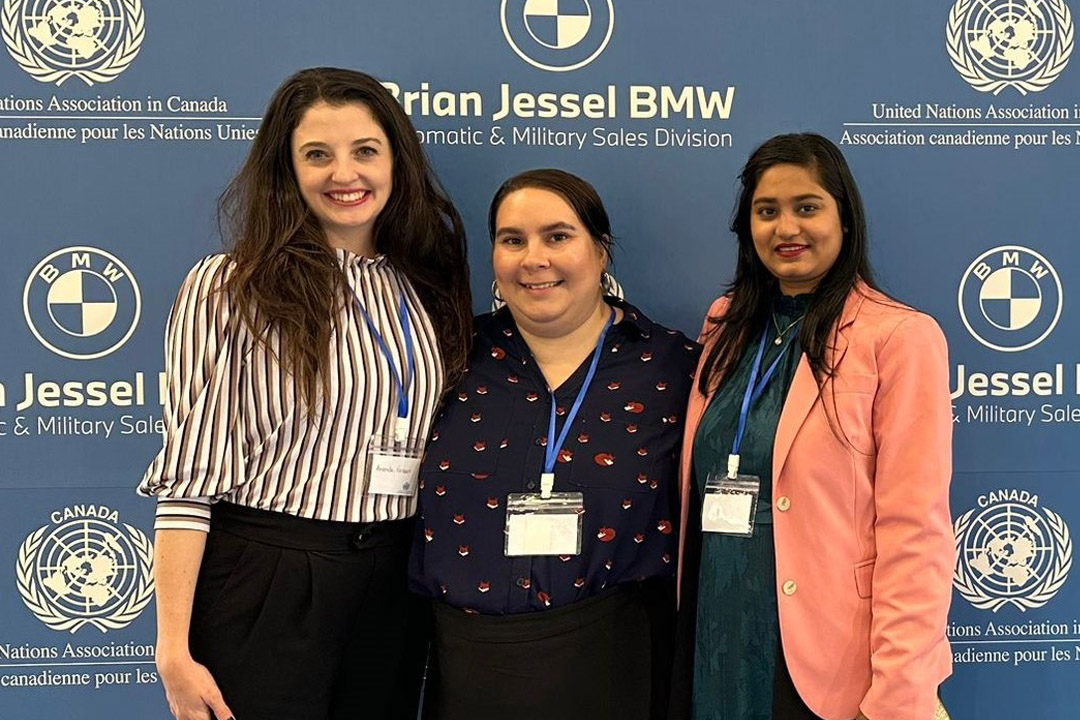
USask students address Indigenous rights at Model UN
Adriana Juárez and her colleagues from the University of Saskatchewan (USask) recently experienced both the best of intentions and the limitations of the United Nations.
By James ShewagaShe also came home from the recent Model UN conference in Vancouver with renewed determination and dedication to make a difference, and to encourage support for the implementation of the United Nations Declaration on the Rights of Indigenous Peoples (UNDRIP).
“I would say the most surprising thing to see was that UNDP (United Nations Development Programme) can create really important resolutions, but it always comes down to governments, which I thought was pretty frustrating because we discussed so many useful things in terms of infrastructure and other forms of development,” said Juárez, a master’s student in Indigenous studies at USask. “But ultimately, we realized that they can just be taken as suggestions.”
Juárez was joined at the Model UN in Vancouver from Oct. 13-15 by fellow USask Indigenous Studies graduate student Sadia Afrin Lema, as well as Amanda Vanzan, a USask research assistant and student in the College of Pharmacy and Nutrition. With the upcoming United Nations’ Human Rights Day on December 10 marking the 75th anniversary of the Universal Declaration of Human Rights (UDHR), the Model UN was a timely eye-opening experience for the three USask scholars, bringing together a diverse group of students from different backgrounds across Western Canada to focus on Indigenous rights across the country and around the world.
“I think it would be great to work for the United Nations in the future, especially within international Indigenous rights since that is more of my focus,” said Juárez, a Mestizo settler from Saskatoon, with heritage from Latin America and Europe. “I am also a sessional lecturer for Indigenous Studies 107, so I thought that it would be really beneficial to attend as we discuss UNDRIP.”
The delegates teamed up to debate and draft resolutions focused on Indigenous rights in a mock United Nations General Assembly, mirroring the format and process that occurs at the UN in New York. Both Juárez and Lema recently took part in the USask Department of Indigenous Studies 40th Anniversary event on Sept. 22. The October Model UN hosted by the United Nations Association in Canada – with President and CEO Jaime Webbe in attendance – provided a new opportunity to connect and collaborate with fellow students from other institutions on Indigenous issues.
“Participating in the Model UN forum on the UNDRIP enlightened me about the critical nexus between Indigenous rights and health care, underscoring the imperative for culturally sensitive and inclusive approaches in global health policies,” said Lema, an international Indigenous Studies student from Bangladesh who also serves as a teaching assistant at USask and as council chair and chief electoral officer of the Graduate Students’ Association.
“It was an incredible opportunity for networking, and the profound discussions and resolutions crafted during the event have ignited a deeper commitment within me to actively engage at both the national and international levels, advocating for the advancement of Indigenous human rights and equitable health care opportunities.”
For Lema, it was rewarding to work together with others from across Western Canada to spotlight and highlight the challenges faced by Indigenous Peoples in the critical area of health care.
“Among the resolutions put forth, there was a consensus on the integration of Indigenous cultures and languages into medical facilities, including increased representation of Indigenous health-care professionals, such as doctors and nurses, as well as the issuance of prescriptions in Indigenous languages,” she said. “Additionally, our proposals underscored the importance of developing programs and infrastructures that foster equitable health care opportunities for Indigenous populations. Furthermore, we strongly urged states to engage closely with Indigenous Knowledge Keepers and representatives in order to enhance health care facilities, collaboratively.”
For her part, Vanzan was inspired by the presentations made throughout the conference by Indigenous delegates and speakers, as participants debated and determined resolutions that they would like to see the global community implement to support the universal human rights standards and fundamental freedoms outlined in the UNDRIP framework adopted by the United Nations.
“One of the things that most impacted me was listening to Indigenous representatives as they shared their traditions, stories, language, and I was very thankful to have the opportunity to learn from them,” said Vanzan, who is originally from Brazil and is serving as a research assistant in the College of Pharmacy and Nutrition and working towards becoming a licensed dietician after completing a Master of Science (Nutrition) at USask in 2022.
“I wanted to be more involved with the rights of Indigenous Peoples. Attending this event was a great opportunity for me to learn from them, and engage in important discussions of how I can support them.”
While their Model UN experience illuminated some of the real-world difficulties of turning resolutions into reality while navigating international diplomacy through the UN, Juárez did leave the conference with renewed confidence in the commitment of the country’s youth to continue the call for fundamental Indigenous rights.
“I think the most important thing that I saw at the event was how smart and outspoken our youth are,” said Juárez, who earned her Bachelor of Arts at USask in 2019, with double honours in Indigenous Studies and Anthropology. “My group had a mix of high school students, undergrads and graduate students, but everyone was clearly on the same level and all spoke with the same confidence and passion. I wouldn't say it necessarily inspired me to become more involved because that is really the basis of my education already, but it did make me think about how I can apply it, and possible PhD programs I would like to apply to, such as Public Policy.”
Together, we will undertake the research the world needs. We invite you to join by supporting critical research at USask.

